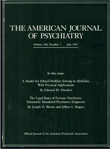Informative morphogenetic variants in patients with schizophrenia and alcohol-dependent patients: beyond the Waldrop Scale
Abstract
OBJECTIVE: The authors evaluated the presence or absence of informative morphogenetic variants in patients with schizophrenia compared with alcohol-dependent patients. METHODS: Taking into consideration the criticisms of the Waldrop Scale, which was widely used until recently to define the presence of informative morphogenetic variants, the authors evaluated the presence or absence of 56 informative morphogenetic variants in 50 consecutively admitted patients with schizophrenia and 50 consecutively admitted alcohol-dependent patients. They made a distinction between minor malformations (those developing during organogenesis) and phenogenetic variants (those developing after organogenesis). A kappa index above 75% was considered reliable. RESULTS: Thirty-four of the 56 informative morphogenetic variants met the authors' reliability criterion. Patients with schizophrenia had significantly higher rates of three minor malformations (furrowed tongue, multiple buccal frenula, and hemangioma) and two phenogenetic variants (protruding auricle and large tongue). CONCLUSIONS: The results suggest that using finer distinction in the evaluation of informative morphogenetic variants in schizophrenia may open new perspectives in the research of the neurodevelopmental background of schizophrenia.



